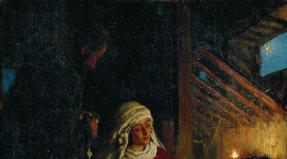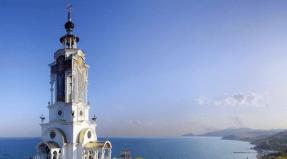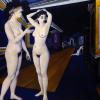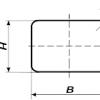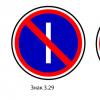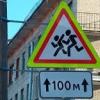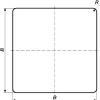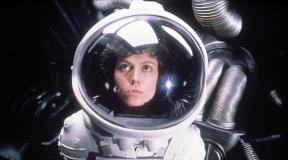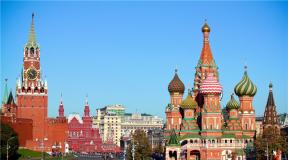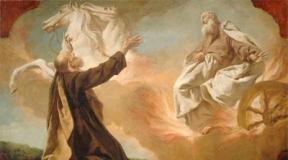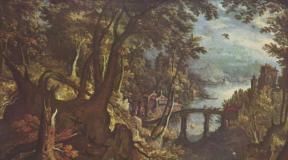The role of history in the formation of personality. Chapter thirteen
But a person, relatively free from external necessity, subordinates his actions to the influence of his own motivation. Freedom from reactions to the “world” and from opportunistic adaptations to the “world” is a great achievement of the spirit, emphasized ON THE. Berdyaev.It is an essential condition for historical creativity. Civil society, replacing the totalitarian power of the state over the individual, determines the growth of the subjectivity of society, expands the possibilities of the individual's influence on the historical process.
Are there objective criteria to determine the role of the individual in history? Traditionally, historians have either seen significant historical events or “heroes”, prominent personalities participating in such events. As for ordinary people involved in the historical process, they were considered only as a kind of "mass" of individuals whose combined actions gave rise to historical facts. However, it can be argued that each person exerts his influence on social life and is responsible for it. The origins of this influence are rooted in personality traits that manifest themselves in social activities.
Social action is understood as not every action, but only that which is characterized by awareness of the goals and conditions of their implementation, interconnection with the actions of other people, taking into account their interests and needs, self-esteem of their actions and orientation towards assessing their behavior by others. Therefore, social action is inseparable from the relationship of people in society, is its most important form. Humanity is one breath, one living warm being, wrote A. Platonov. It hurts alone - it hurts everyone. One dies - everyone dies. Each person acts in accordance with his individual set of value orientations. One seeks to rule, the other obeys the despot, one seeks success and prestige, the other bears ascetic ideals, notes the modern American philosopher E. Fromm. He calls two main ways of human existence: possessionand beingand emphasizes the destructive consequences of the principle of ownership in life of the individual and society. Of great importance is the extent to which the actions of the person correspond to the needs of society, how they relate to the interests of other people.
The influence of the individual on the historical process is proportional to the social significance of his personal role. Certainly unequal, ceteris paribus, are the influence of the leader of the socio-political movement or major statesman, on the one hand, and the rank-and-file functionary, on the other. But one cannot but take into account how a person will behave in a particular historical situation, what choice he will make, and what abilities he will develop. It all depends on his free choice. And this choice will determine its influence on his immediate environment and, ultimately, on society as a whole. The difference in functions, type of activity will determine the strength of this impact, and moral qualities - its positive or negative orientation.
The volitional qualities and abilities of the individual are also important. Doubtfulness and indecision, fear and revenge, a feeling of unhappiness or inferiority, resentment and a bad mood - all these volitional qualities have a fatal effect on the social actions of a person, his role in the historical process.
Similarly affect the ability of the individual. Berdyaev wrote: “A man was created by the Creator of genius (not necessarily a genius) and genius must be revealed in himself by creative activity, to conquer all personally selfish and personally selfish, any fear of his own death and any eye on others.” The mass consciousness often gives outstanding political or military figures extraordinary qualities - intelligence, will, ability, knowledge, talent and even genius. And this is no coincidence. The role is correlated with personal qualities, but not always. It happens that a mediocre and funny character pops up to the surface of historical events, who, according to Marx, has to play the role of a hero. The discrepancy between the claims of the personality and its capabilities is most often expressed in authoritarian behavior, in the desire to subjugate everyone and everything, using any means for this. Yet Spinozawrote about violent rule, which infringes on the minds and tries to prescribe that everyone should accept for truth and reject as a lie. Distinctive features of the mind, will, and experiences of the individual are manifested depending on the value orientations of the individual. Namely, values \u200b\u200bas ideas about an ideal, desired, normatively approved, mediate a person’s free choice.
The role of the individual in history can be both insignificant and enormous. G.V. Plekhanov wrote: “A great man ... is a hero. Not in the sense that he could stop or change the natural course of things, but in the fact that his activity is a conscious and free expression of this necessary and unconscious approach. This is all his meaning, this is all his strength. But this is a colossal significance, a terrible force. ”
Societies and its institutions create relatively equal conditions for freedom in accordance with the affiliation of people to various social groups. The more democratic the society, the greater the equality in providing people with their civil rights and freedoms. Erich Frommnotes that human existence is fundamentally free, not constrained by anything. This, however, does not mean that all people are equally free. There is not only external, but also internal determination of freedom. People not only strive for freedom, but also flee from it. Fromm called the submission to the leader in totalitarian regimes and conformism (imitative behavior) - in democracies - the main forms of escape from freedom.
But in man are hidden both the origins of creation, and the origins of destruction, destructiveness, hatred and authoritarianism. He can express his powerlessness before life in destructive, destructive actions. Therefore, there is a danger of turning freedom into a factor of instability and disorganization of society. The creation of a system of civil regulation of relations between the individual and society is aimed at establishing a reasonable balance between individual freedom and the interests of society. Kantdefined law as “the totality of conditions under which the arbitrariness of one is compatible with the arbitrariness of another in terms of the universal law of freedom”.
Any self-organizing social system has a corresponding system of private freedoms. This is the premise of the civilized foundations of a person’s life and one of the values \u200b\u200bof human life.
In conclusion, we emphasize: historical necessity is impossible outside the social actions of specific individuals, each person. The significance of our efforts, the role and responsibility of each of us for the fate of society and culture increases as the possibilities of free choice and self-fulfillment expand..
test questions
What is a society?
What is social production ?.
What are the features of subsystems of society? What is their unity?
What is civilization?
Is European civilization really the highest and is called to indicate the main path of development of all mankind?
What is a culture? What is its connection with civilization?
What are the criteria to determine the role of the individual in history?
Expand the meaning of the concept of everyday life and its role in the preservation of civilization.
Topics of reports and essays
Alternative concepts of the historical process: Max Weber, Karl Marx.
The historical need and freedom of creativity.
Property and social inequality: the likelihood of their exclusion from society.
Social psychology and ideology in the individual and public consciousness.
Power and politics: myths and reality.
TOPIC 24. MAN.
LESSON PLAN
I. Organization of the start of classes.
II. Message topics, objectives of the lesson. Motivation for learning activities.
Objectives:
Educational:
Know the definitions of "individual", "individuality", "personality", their similarities and differences.
Developing:
Continue to improve the ability to be a reflective practitioner;
Improve the ability to evaluate information;
Develop skills to identify biased relationships, opinions and judgments.
Educational:
To know and shape the qualities of a successful person is conscientiousness, responsibility, hard work, justice, mutual respect.
Motivation for learning activities:the purpose of life is the presence of its meaning, and improving oneself in relation to the meaning of life, and the more you are satisfied with your ability to achieve this ideal, the closer we are to the realization of the problem of happiness.
III. Updating students' supporting knowledge.
1. What are the features of Russian philosophy?
2. What stages of development did the Russian idea go through?
3. What are the prospects for the further development of the Russian idea?
4. What are the main features of the program of development of Russian philosophy of I.V. Kireevsky?
IV. Learning new material.
Lecture plan.
Man as an individual, as an individual.
2. Man as a person.
3. The role of personality in history.
Literature
1. Introduction to philosophy. Frolov I.T. (in two parts) M.1989
2. Spirkin A.G. Philosophy: a textbook. M. 2004. Introductory word.
3. Stepin V.S. Philosophy. Mn 2006.
4. Petrov V.P. Philosophy. M. 2012. Lecture 1.
5. Philosophy. (team of scientists) Rostov n / a. 2001.
6. Yakushev A.V. Philosophy. M., 2004.
V. Consolidation of new knowledge.
1. Who is a person?
2. Why do people use the concepts of a person: an individual, an individual, an individual?
3. What is a “historical person”?
4. Can a person really play a historical role in history?
VI. Summarizing the lesson.
VII. Post homework.
1. Give a brief description of the concept of "individual"?
2. What is the difference between an individual and an individual?
3. What qualities are inherent in a person?
Man as an individual, as an individual
Individual.
A number of special terms are used to characterize a person as an individual phenomenon in philosophical and psychological literature. The most important of them are the individual, individuality, personality, subject, self, etc. A specific content is embedded in each of these concepts. Man is a unique phenomenon in the universe. He is unique, mysterious. Neither modern science, nor religion, nor philosophy can fully reveal the mystery of man. When philosophers talk about the nature and essence of man, or his other characteristics, then it is not so much about their final disclosure, but about the desire to once again return to them and, perhaps, supplement or clarify them. The concepts of "nature", "essence" in relation to man are often used as synonyms. However, there is a difference between them. Under the "nature" of man is meant persistent unchanging traits, common inclinations and properties expressing his features as a living creature, which are inherent to him at all times regardless of biological evolution (from the moment a person was formed) and the historical process. The nature of a person is revealed by such concepts as “individual”, “subject”, since they include such characteristics as will, specificity of thought processes, affectiveness, neurodynamic characteristics, gender, age, constitutional differences, etc. The characteristics of “personality” are more associated with the concept of human nature "and" personality. " In a more strict form, the term "individual" is used to refer to any individual representative of the human race. In social philosophy, this term denotes the individual representative of a single whole. The individual is "instantiated", that is, not just one, but "one of." An individual is a biosocial creature genetically associated with other life forms, but isolated from them due to the ability to produce tools, abstractly think and adapt the world around him. A person as an individual, possessing specifically unique, distinct from typical features — individuality, was formed as a herd, social being. Therefore, at any moment it exists as a “product” of social relations. Society not only surrounds a person, but also lives "inside him." The era in which a person was born and formed, the level of culture that society has reached; the way of life, the way of feeling and spirituality (mentality) - all this leaves a mark on individual behavior, determines the initial, often unconscious, attitudes and affects the motives of actions. A person does not just have to reckon with the conditions and capabilities of the existing society, he must also understand that he owes the latter many qualities that at first seemed to be independent acquisitions. Characterizing an individual as a product of social relations does not mean at all, however, that it is as if the initial conditions of individual existence (for example, the nature of upbringing, family or social environment) once and for all determine the subsequent behavior of a person.
Individuality. The irreducibility of a person to the general features of his natural essence or social group position, the relative independence of behavior from the factors that initially determined it, the ability to be responsible for one’s appearance, to have value and significance in the eyes of society — all these characteristics capture “individuality” and “personality”, close and interconnected concepts. They express not only the difference between humans and animals, but their essence. When born as an individual, a person becomes a person later. And this process has a social character.
Individuality as a further development of man is his essential characteristic, since it reflects the unique way of his being. Individuality is the originality of feelings and character traits, the originality of thinking, talents and abilities inherent only to a given individual, this is a combination of properties and characteristics that distinguish this individual from all others, a characteristic of a person's individuality, its uniqueness and originality, its irreplaceability.
2. Man as a person. The concept of personality emphasizes in a person, first of all, a conscious-volitional and cultural-social principle. An individual more deserves the right to be called a person, the more clearly he realizes the motives of his behavior and the more strictly he controls it, subjecting his behavior to a single life strategy and responsibility. The person is interested in her actions. A person is determined by which line of behavior she chooses. The personality is its own initiator of a series of life events. The dignity of a person is determined not so much by how much a person has succeeded, but by what and how he took under his responsibility, what he imputes to himself. Being a person is very difficult. And this applies not only to outstanding personalities who have assumed responsibility not only for themselves, but also for the country, for the people or humanity as a whole, for the political or intellectual movement, but also for any person in general. Personal being is an ongoing effort. There is no personality where the individual refuses to take the risk of choice, tries to avoid an objective assessment of his actions and analysis of his motives. In a real system of social relations, evading independent decisions and responsibilities is tantamount to recognizing personal insolvency and consent to a subordinate existence, to petty social and bureaucratic supervision. For a deficit of conscious-volitional principles, people have to pay with a failed fate, disappointment and a sense of their own inferiority.
In the social literature there are various approaches to understanding what a person is: A). A personality is described from the side of its own motives and aspirations, which make up the content of its "personal world" - a unique system of personal meanings, individually peculiar ways of organizing external impressions and internal experiences. B) The personality is considered as a system of relatively stable, externally manifested characteristics of the individuality, which are fixed in the judgments of the subject about himself, as well as in the judgments of other people about him. IN). A personality is characterized as an active, active "I-subject", as a system of plans, relationships, orientations, semantic formations that characterize its behavior outside, outside the original positions. D). A personality is considered as a subject of personalization: that is, when the needs, abilities, aspirations, values \u200b\u200bof a given subject cause changes in other people, affect them, determine their orientation. By and large, philosophy considers such an individual to be an individual who has his own position in life, to which he comes and which he realizes thanks to his great spiritual work on himself. Such a person shows independence of thought, unbanality of feelings, a certain integrity of nature, inner passion, creative streak, etc. A personality is a socialized individual, considered from the side of the most essential and significant social qualities. A person is a self-aspiring, self-organizing particle of society, taking into account the features and characteristics of a society in which it exists, respectful of culture and universal values, respecting them and making its contribution to universal human culture and history.
Summing up the concept of personality, we can draw the following conclusions: 1. The concepts of "man", "individual", "subject of activity", "individuality", "personality" are not unambiguous and contain differences. 2. The extreme interpretations of the concept of "personality" should be taken into account: broad - here the personality is identified with the concept of "person" (any person is a person); elitist understanding - when a person is considered as a special level of social development (not every person can become and becomes a person). 3. There are different points of view on the correlation of biological and social in the development of personality. Some include biological organization in the structure of personality; others - consider biological facts only as predetermined conditions for personal formation, which do not determine the psychological and social characteristics of a person. 4. Persons, indeed, are not born. They become, and the formation goes on practically all his life. The data show that in ontogenesis (individual formation), personal qualities are formed quite late even in the norm, and some never seem to “grow”, so there is a large percentage of infantile people. 5. Personality is the result of successful socialization of a person, but not a passive product of it, but the result of one’s own efforts. Only in activity does the individual appear and assert itself as a person. Preserving ourselves as a person is the law of human dignity; without it, our civilization would lose the right to be called human. A person simply must be a person, strive to become a person. The level of personal development is measured by the expression in a person of intellectual, moral and volitional qualities, the coincidence of his life orientations with universal values, and a positive indicator of the functioning of these qualities. The personality is characterized by the spirit, freedom, creativity, kindness, affirmation of beauty. A person is made a person by caring for another person, autonomy in decision-making and the ability to bear responsibility for them.
The role of personality in history.
Often, in developing this problem, philosophy exaggerated the role of the individual in the historical process and, above all, of statesmen, believing that almost everything is decided by outstanding personalities. Kings, kings, political leaders, commanders, supposedly, can control the whole history and manage it, like a kind of puppet theater, where there are puppeteers and puppets. Historical personalities are personalities placed by the force of circumstances and personal qualities on the podium of history. Hegel called the world-historical personalities of those few outstanding people whose personal interests contain the substantial components: the will, world spirit or the mind of history. “They draw their strengths, goals and their calling from a source whose contents are hidden, which is still underground and knocks into the outside world, like in shells, breaking it” (Hegel. Op. T. IX, p. 98).
“Studying the life and work of historical figures, you can see,” wrote Machiavelli in the work “The Sovereign,” that happiness did not give them anything other than a case that delivered material into their hands that they could give forms in accordance with their goals and principles; without such "cases of valor they could fade away without an application; without their personal merits, a case that gave them power would not be fruitful and could pass without a trace." It was necessary, for example, that Moses found the people of Israel in Egypt languishing in slavery and oppression, so that the desire to get out of such an intolerable situation prompted them to follow him.
According to Goethe, Napoleon became a historical person, first of all, not because of his personal qualities (he, of course, had a lot of them), but the most important thing is that "people, obeying him, thereby hoped to achieve their own goals. That is why they followed him, as they follow anyone who inspires them with this kind of confidence "(Goethe. Collected. Op. T., 15. P. 44-45). Interesting in this regard is the statement of Plato: "The world will only become happy when the sages become kings or kings sages" (Quoted from: Eckerman. Conversations with Goethe. M., 1981, p.449). No less interesting is the opinion of Cicero, who believed that the strength of a people is worse when it does not have a leader. The leader feels that he will be responsible for everything, and is concerned about this, while the people blinded by passion do not see the danger to which he exposes himself.
Having become the head of state by chance or by necessity, a person can have a different influence on the course and outcome of historical events: positive, negative, or, as often happens, both. Therefore, society is far from indifferent in whose hands the political, state power is concentrated. Much depends on her. V. Hugo wrote: “The distinguishing feature of genuine statesmen is precisely in order to benefit from every need, and sometimes even turn the fatal combination of circumstances for the good of the state” (Hugo V. Sobr. Soch. T.15, p. 44 -45). A leader alone, if he is a genius, must subtly “eavesdrop” on the thoughts of the people. Curious in this connection is the reasoning of A.I. Herzen: “A man is very strong, a man placed in a royal place is even stronger. But here again the old thing: he is strong with the course and the stronger he understands it. But the flow continues even when he does not understand it and even when he opposes it "(cited from: Lichtenberg G. Aphorisms. M., 1983, p. 144).
Such a historical detail is curious. Catherine the Second, when asked by a foreigner why the nobility obeys her so unconditionally, replied: "Because I only order them what they themselves want." But high power, however, carries heavy responsibilities. The Bible says: “To whom much is given, much will be asked” (Matthew: 95.24-28; Luke: 12, 48). Do all former and present rulers know and follow these commandments?
An outstanding personality should have high charisma. Charisma - "God's spark", an exceptional gift, outstanding abilities that are "from nature", "from God." A charismatic person in himself spiritually influences his environment. The environment of a charismatic leader can be a “community” of students, warriors, co-religionists, that is, it is a kind of “caste-party” community, which is formed on charismatic grounds: the prophet corresponds to the disciples, the military leader - retinue, the leader - proxies. The charismatic leader surrounds himself with those in whom he intuitively and by the power of his mind guesses and captures a gift similar to himself, but "lower in growth." It seems that of all the above concepts about the place and role of the leader, the leader, the most acceptable option seems to be the happy option when the head of state becomes a wise man, but not by himself, not a wise man, but a wise man who clearly and timely captures the mood of the people who have trusted power to him, able to make his people happy and prosperous.
Although not everything is so blessed in the science of philosophy. Yes, and in historical science, too. Since the time of Plato, philosophers and historians have been arguing among themselves that what is more important is the progressive movement or personality, which at one time or another gives an inevitable historical kick to humanity. This debate lasts for centuries and, most likely, can only be resolved when humanity decides for itself another no less important philosophical question - the primacy of matter: what was a chicken or an egg before.
Clash of theories
The determinists Engels, Plekhanov, Lenin, etc., familiar to us from childhood, believed that the role of the individual in history is certainly important, but it can in no way be more influential than the general historical, evolutionary, law-forming development.
The personalists - Berdyaev, Shestov, Scheler and others, on the contrary, are convinced that it is a person, and, importantly, a passionate person who has come to this world, which moves the development of history forward. Whichever side the passionary belongs to, good or evil.
If, then between the theories is this: some believe that the individual can influence the course of history, but is not able to cancel its progressive movement, others are sure that the progressiveness of historical development largely depends on individuals who live in this or that historical period.
Some believe that everything happens exactly when it should happen, and not an hour or a minute earlier, not to mention the fact that by an hour or a minute they mean centuries and millennia. Even if a certain incident happens in history, a personality is born that bends the ongoing historical process and sets up an unprecedented acceleration for it, such as, for example, Alexander the Great, then with the death of this person everything ends. And even more than that: society abruptly rolls back, and instead of progress, regression sets in, as if history or God himself were self-removing and taking short-term vacations.
Others are convinced that only a unique Personality gives humanity the opportunity to progress, and the more rapidly the progress, the larger the scale of this person.
Personalities who have given a kick
It would seem that the evidence of the materialists is undeniable. Indeed, with the death of Macedon, the empire he created fell to pieces, and some previously quite prosperous states fell into decay. The peoples who inhabited them disappeared somewhere in the unknown. As, for example, the Khorezm state defeated by Alexander under the rule of the Achaemenids - according to the legend of the descendants of Atlantis. So, after Alexander, the last beautiful Atlanteans disappeared. And not only them. With his death, what we call Ancient Greece also disappeared. But! It is impossible to deny that what he created set a certain impetus for subsequent generations, for those who were born after it. The Asia he opened for the West and the West for Asia gave an impetus to the endless centuries of human Brownian movement.
In fact, among the many really great people who have left their mark on the history of mankind, perhaps there are not so many who can be put in a row after Alexander the Great.
Perhaps there are just over a dozen of them: Archimedes and Leonardo Da Vinci, Lenin, Hitler and Stalin, Gandhi, Havel and Golda Meir, Einstein and Jobs. The list may be different - large or even smaller. But it is undeniable that these individuals were able to change the world.
Send your good work in the knowledge base is simple. Use the form below
Students, graduate students, young scientists who use the knowledge base in their studies and work will be very grateful to you.
Posted on http://www.allbest.ru/
- Introduction
- 1. People and nation
- 2. Mass
- 3. Crowds
- 4. The role of personality in history
- 4.1 Factors determining the historical role of the individual
- 4.2 The role of personality in the dynamics of changes in social structure
- Conclusion
- List of references
- Introduction
The problem of the subjects of history is the most important problem of social philosophy. Even the questions themselves: "Who makes the story?" and "Who makes the story?" Often cause heated debate. At one time, there was a sharp controversy between the English philosopher J. Lewis and his French colleague L. Altuser regarding the expression "to make history." J. Lewis claimed that man makes history. Altuser sharply objected to him. History, he argued, cannot be done. They make objects, things, not history. So, the "carpenter who" makes "the table already has the primary matter - wood. He turns it into a table." But, Altuser continues, a carpenter will never say that he makes a tree, because he knows very well that this tree is a product of nature and exists independently of it. From Lewis’s point of view, Altuser believes, “man has already made history with which he makes history! Consequently, man creates everything in history: not only the result as a product of his“ work ”(history). But before that he created the primary matter (history) ), which turned into a story. " But only God, who is beyond the limits of history itself, can act as such an all-doing person. Not a man, Althuser rightly concludes, but the masses and classes make history. The subjects of history are the people, nation, mass, crowd, social classes, outstanding personalities. We give a more detailed description of all these entities.
1. People and nation
Usually the term "people" is used in three senses. Firstly, this concept covers all people living in any country. Say, when they say "American people", they mean all Americans living in the United States, regardless of their race and nationality, as well as property status. In this case, the concept of the people coincides with the concept of the population. Secondly, the people are the working people, creating material and spiritual values \u200b\u200band not appropriating the labor of others. Thirdly, a people is an organized whole that has a single psychology (mentality), culture, traditions, language, customs, a single territory, common economic ties, etc. This is a stable community of people with their "ethnic" interests.
For a long time there was a discussion in the domestic literature regarding the correlation of the concepts of “people” and “nation”. At the same time, the whole debate revolved around the definition of a nation given by Stalin. In the work "Marxism and the National Question", Stalin gives the following definition of a nation: "A nation is a historically established stable community of people that has arisen on the basis of a common language, territory, economic life, and mental structure that manifests itself in culture."
This definition of the nation for our researchers served as a standard for studying the nation until the death of Stalin, but after the death of Stalin and especially after the 20th Congress of the CPSU, the pendulum arrow turned in the opposite direction and everything that was written by Stalin was subjected to sharp criticism. It goes without saying that the Stalinist definition of the nation was immediately rejected and, in general, Stalin was accused of all mortal sins. But the fourth sign of the nation — the psychic depot — was especially criticized. It has been argued that there is no specific mental makeup, that all nations have the same mental makeup. At the same time, they completely forgot that, from the point of view of Stalin, the mental structure manifests itself in a culture, the specificity of which, of course, no one denies.
All researchers of the nation, including Stalin, proceeded (and could not help but proceed, for nations first arose in Europe) from Western European realities when studying the genesis of the nation and national relations. And these realities are associated with the formation of bourgeois social relations. The same Stalin writes: “A nation is not just a historical category, but a historical category of a certain era, an era of rising capitalism. The process of eliminating feudalism and the development of capitalism is at the same time a process of folding people into a nation. This happens, for example, in Western Europe. The British , the French, Germans, Italians and others formed in a nation with a victorious march triumphing over the feudal fragmentation of capitalism. "
In the initial period, the bourgeois mode of production presupposes general economic ties, a national market. And this, in turn, presupposes a common territory and a common language. Therefore, socio-ethnic communities involved in bourgeois social relations strive to unite, to have a common territory, common economic relations, a single national state, a single market, a single language in which everyone could communicate. Thus, the process of forming bourgeois social relations and the nation as a new social community of people is a single process. But at the same time, it is also the process of forming a single people with a common economy, a common territory, a common language and a common culture. Hence: in Western Europe, the concepts of nation and people at first coincided. They were used as synonyms. An 18th-century French philosopher, Holbach, for example, wrote: “So, nations are always subject to natural laws: they are also not allowed to harm each other, destroy each other, deprive each other of the advantages that they enjoy, as well as a member of society is not allowed to harm others Each nation has the same obligations to another nation as a person does to another person, each nation must show justice, frankness, humanity to other nations and help them, because they want all this and for themselves "Each nation is obligated to respect the freedom and possessions of another nation." As you can see, Holbach uses the concepts of "people" and "nation" as synonyms. The four features of a nation — the commonality of economic ties, the commonality, territories, the commonality of the language, and the commonality of the psychic mindset that manifests itself in culture — which Stalin leads up to the second half of the 20th century characterized both the nation and the people. A citizen of France, for example, was at the same time a representative of the French people.
In the modern era, the situation has definitely changed due to the fact that in Western Europe there are millions of people who, if they have citizenship, are citizens of the country where they live. But they, until complete assimilation, if, of course, this happens, remain ethnic minorities. In the same France, hundreds of thousands of Arabs, blacks, representatives of Asian peoples. They are all French if they have French citizenship, but they are not part of the French people.
From all the foregoing, it follows that the Stalinist definition of a nation proceeded from those realities that were at the beginning of our century when this article was written. It is at the same time a definition of nation and people. And it still has not lost its scientific significance.
However, today it is necessary to give a different definition of the nation. Such a definition is given by Yu.I. Semenov: "A nation is a collection of people who have one common fatherland." Indeed, all citizens of a given state, regardless of their ethnic origin and ethnicity, constitute a single nation. All with French citizenship are French, although not all of them belong to the French people. In other words, not all of them are ethnically French.
2. Mass
If the concept of a people is a socio-ethnic concept, then the concept of a nation is a socio-political concept.
The mass, in the expression of the Spanish philosopher Ortega y Gasset, is a multitude of people without special merits. The masses have some common features: tastes, interests, lifestyle, etc.
Jaspers considers the mass as people who are not connected with each other, but in their combination represent some kind of unity. But "the mass as an audience is a typical product of a certain historical stage; these are people connected by perceived words and opinions, not delimited in their belonging to different sectors of society." The mass makes up its opinion, which is not the opinion of a single individual, but is called public opinion.
Canetti E. actually identifies the mass with the crowd and believes that the masses arise suddenly and also suddenly disappear. “It was five, maybe ten, maybe twelve people, no one announced anything, no one expected anything - and suddenly everything around is black from people. People flow from everywhere, it seems that all the streets have become one-way traffic. Many don’t even know what happened, ask them - they have nothing to answer, but they are in a hurry to be where the others are. Their movement has a resolve that is very different from ordinary curiosity ... They have a goal. It is there before they can realize it, and this goal is the blackest, that is, the place where the most people are. " Canetti exaggerates the sudden appearance of the masses. This is not entirely true, unless, of course, we are talking about onlookers who gather, say, during a major car accident. Under normal conditions, someone organizes the mass, someone leads somewhere. Rallies and processions, for example, are led by certain political forces. Of course, many people join the rallies and demonstrators, who generally share the mood of the masses.
Canetti identifies four mass properties:
1. The desire for numerical growth.
2. Equality within the masses. “It is absolutely and undeniable and the mass itself is never called into question. It is fundamentally important so that the mass state could be defined as a state of absolute equality ... For the sake of this, people turn into mass. Everything that can distract from this "It does not deserve attention. All the requirements of justice, all theories of equality derive their energy from the experience of equality, which everyone knows in his own way from the mass sense."
3. Density. Mass, according to Canetti, loves density, she experiences the feeling of greatest density as a feeling of strength.
4. The focus. The mass must know where to move and what to do. This focus strengthens the sense of equality and the need to achieve a goal.
B.A. Grushin thus defines the concept of mass: "Masses are situationally emerging (existing) social communities, probabilistic in nature, heterogeneous in composition and statistical in form of expression." He distinguishes between these types of masses:
1) large and small;
2) stable (constantly functioning) and unstable (impulsive);
3) grouped and ungrouped;
4) contact and non-contact (dispersed);
5) spontaneous (spontaneously arising) and organized (institutionalized but generated).
Masses arise from time to time. They can appear by chance when a huge number of people accumulate in connection with a particular event. But they can be organized in advance and taken to the streets for holding various political events (rallies, demonstrations, etc.).
3. Crowds
people nation historical person
The concept of the crowd is close in content to the concept of the mass, but it is very different from the concept of the people. The crowd is something unorganized, random gathering of people, guided not so much by reason as by feelings and emotions, it is dominated by herd consciousness, and it is ready for momentary “heroic” sacrifices, especially when fanatical leaders appear at its head in order to achieve their selfish goals. And N.K. Mikhailovsky was justified when he wrote that the crowd should "call the masses that can be carried away by example, again highly noble, or morally indifferent." The crowd cannot create, it can only destroy, its psyche is easy to use for the destruction of social institutions and orders. Therefore, it is very dangerous for society when politicians operate with the opinion of the crowd and intend to implement the decisions adopted by the crowd. Of course, real, responsible leaders take into account the mood of the crowd, because they ultimately reflect the real picture of society. But the crowd does not live long, it quickly dissolves, although it quickly arises. It often serves as the social base of nationalist and chauvinistic political movements and organizations. The lower the level of political culture of the crowd, the more dangerous it is, and this danger cannot be ignored. The crowd is often used during the election campaign, when each candidate wants to get more votes. She is promised mountains of gold, as a rule, she believes this and promises to vote for that particular candidate in the legislative bodies who promises more and speaks more beautifully.
The true subject of history is the people, not the crowd or the mass. But the crowd (mass) often plays an important role in a particular historical event, which then had a serious impact on the subsequent development of human society.
4. The role of personality in history
As you know, the manifestation of any, even the most general, laws of history is diverse and multivariate. The role of the most outstanding personality is always a fusion of previous development, a mass of random and nonrandom events and its own characteristics. There are many ways of organizing society, and, consequently, there will be many options for the manifestation of personality, and their amplitude can be huge. Consequently, depending on the most diverse conditions and circumstances, taking into account the characteristics of the place, time and individual personality traits studied, its historical role can range from the most inconspicuous to the huge.
Sometimes a person plays a decisive role. But it is impossible not to notice that in some eras and the most outstanding people are powerless in the face of circumstances. There is also no doubt that the role of the individual depends on many different reasons and only “it seems that the heroes create themselves and that their actions created such a state and such relationships in the world that are their work and consciousness” (Hegel). But on the other hand, it is the actions of leaders (and sometimes ordinary people) that determine the outcome of the confrontation and the fate of various trends. We must not forget about the differences in the manifestations of laws and accidents for an individual society and humanity. The beneficial or fatal role of personality for the former, usually for the latter, will be substantially different (except in extreme cases). But even today, in conditions of close rapprochement of mankind, the danger of uncontrolled actions on the part of one person is of the most serious nature.
In the most generalized form, we are talking about the fact that, due to their personal characteristics, or occasion, or social status, or the specifics of the time, etc., a person can turn out to be the very fact of his existence, his ideas, actions or inaction, directly or indirectly, during his life or even after his death, there is such an impact on his or other societies that can be considered important, since they left a noticeable mark on the history and further development of societies (positive, negative or some other).
4.1 Factors determining the historical role of the individual
The impact of all the typical reasons that determine the role of the individual can be denoted by one term - “Situation factor”. It consists of: a) the characteristics of the environment in which the person acts (social system, traditions, tasks, etc .; b) the state in which the society is at a certain moment (stable, unstable, is on the rise, downhill, etc. .P.); c) the characteristics of the surrounding societies; d) the characteristics of formation time (i.e., the general characteristics of the period of the historical process, including the degree of integration of societies, the pace of development, etc.); e) the proximity of society to the “general line” of history, which increases or decreases the ability to influence many societies and the historical process as a whole; e) the favorable moment for action; g) the characteristics of the personality itself and the needs of the moment and the situation precisely in such qualities; h) the presence of competitive figures; i) others.
The strength of factors in different cases may be different. If we consider the influence of personality on all of humanity, then the points “c”, “g”, “d” will be important here; if the reasons are failures of reforms, then “a”, “b”, “g”, “h”. Etc. In general, the more of the above favors the personality, the more important its role.
Analysis from the position of a factor of the situation allows not only to combine different points of view, but also to localize them, having determined the scope, to “trim” their claims. In addition, this approach facilitates the study of a particular case (since it outlines the range of questions, gives the direction of the search, etc.), without at all predetermining the result.
I must say that, although in general the factor of the situation is not sufficiently taken into account, one of its points is position within society - A number of researchers highlight. True, for the most part this is in the nature of passing and sometimes fuzzy comments, however, one way or another, they note two main states: 1) stability and strength; 2) instability, chaos, revolutions, crises, etc. Moreover, the less durable and stable the society, the more old structures are destroyed there, the greater the influence of an individual personality on him. In other words, the role of the individual is inversely proportional to the stability and strength of society.
4.2 The role of personality in the dynamics of changes in social structure
However, stability and especially instability have many options, each of which has very significant features (plus, of course, specific things). So stagnation is different from strength under normal territorial or economic growth; and especially from the conditions of rapid growth. Sustainability can be with slow degradation or decline. Even with stability, much depends on how the social system is “regulated” by one person. The options for social withdrawal are also diverse: reform is different from revolution, peace revolution is different from civil war, etc.
Therefore, ideas about changes in society as about the process of changing its states (phases). Further, for example, one of a number of models of such a process consisting of 4 phases will be shown: a stable society such as a monarchy; social pre-revolutionary crisis; revolution, the creation of a new order.
In the history of societies, perhaps most of the time is occupied by calm eras. If this is a monarchy, then the sovereigns come and go, each managing to the best of their ability, unless something out of the ordinary happens (fatal defeat, death of the heir, etc.). Other forms of government may be better or worse than the monarchy, but it is important to note: the more “checks and balances” are in the system, the more correctly the separation of powers is carried out, the more the society is insured that its leaders will undermine its stability. In any state, a lot always depends on a particular person, but on the whole, such calm, “small” eras are much less susceptible to the individual becoming its “creator," benefactor or demon.
Sooner or later, but the system begins to decline (primarily in societies where there are no “built-in regulators” that allow, at relatively early stages, to identify emerging problems and solve them). Contradictions within it, especially fueled by the borrowing of technology and technology, advanced relations and laws in individual areas, are aggravated. Fortunately, if at this time there is a leader who is able to lead society along the path of peaceful development. In monarchies, this can usually only be an autocrat. In Russia in 1861, such a king (Alexander II) appeared and carried out a series of transformations. In Russia, 1905 and 1917 There was no such thing. An absolute ruler often acts to a large extent as an autonomous, independent force: both in safeguarding the old, contrary to common sense (such was Nicholas I), and in terms of reforming the obsolete, contrary to resistance (such was in many ways Alexander II). The autonomy of such a ruler is also confirmed by the fact that very often changes begin only with the death (overthrow) of him (monarch, dictator), since during life this was impossible.
If the solution of problems inconvenient for the upper strata is delayed, then the idea of \u200b\u200bforcibly resolving them (coup, revolution) arises, and with them various concepts, schemes for reorganizing the world, country, eliminating injustice, etc. Here there are many personalities who seek, one way or another, to transform the system. They represent various social and political directions. Various opportunities (trends and directions) in the development of society here receive not only a clearer class-group expression, but also find their apologists, leaders, heralds, etc. The situation that developed during the reign of Nicholas II, during which three revolutions took place in Russia, is very eloquent.
In such an era, bright personalities are more characteristic of the destructive side, which feels historical and moral right, when the era opens pores and crevices so that a certain number of talented people make themselves known. However, often these are one-sided, implacable, sometimes fanatical people. But talents can emerge on the conservative side (recall, at least, P.A. Stolypin). Good luck if such a leader manages to “blow off steam” and peacefully change the country, defuse the situation. However, this is not always the case. Crises are crises because limited and stubborn people bring the situation to such an extreme that it is almost impossible to get out of it (as, in fact, happened in the case of P.A. Stolypin, which such people did not allow to bring the reforms to the end; is this not the root of the revolutions of 1917). The responsibility of the monarch, if he brings society to an explosion, is more measured by how much such a revolution damaged or, conversely, had a positive effect on the future fate of the state.
So, we see two situations that, speaking in mathematical language, are in different phases (at an angle of 90 °). The era is calm, steady, conservative, in which the role of politicians is usually relatively small. The second situation, when the country is on the verge of a socio-political explosion. Whether it happens or not depends on many factors, including and from the strength of personalities on one and the other. Note that no person is able to create great eras if there are no accumulated conditions in society for this. We will not forget that a personality always manifests itself in a specific environment and acts primarily within the framework of existing tasks and conditions for itself and those groups with which it identifies itself. It is important to remember that individuals do not act in a vacuum, but find ready-made relationships and form in a certain environment. And this reality of the previous one, having refracted in a person, then itself becomes an important condition for its future impact on society.
However, if there are already objective prerequisites for change, then the person is able to accelerate or delay the solution to the problem, give this solution special features, and use the opportunities provided for talented or mediocre. If in place of Peter I a different, “sovereign” sovereign, the era of reforms in Russia would be postponed, then could be late, as in Turkey, as a result of which the country would play a completely different (small, subordinate) role in Europe and the world. But after Peter I often not very talented people ruled, but the phase of society after Peter's reforms and victories was already different, more calm. Even the time of Catherine II, with all her outstanding abilities, is shorter than the era of Peter I. Russian statehood and social structure were placed there, only improved there.
Therefore, the question of the boundaries of the role of the personality in history can be answered this way: if a certain person managed to do something that seems surprising (anyway, in this case, was it progressive or vice versa), then there were potential conditions for this. But far from always the story presents the leader with 100% chances. Very often they are vague, fuzzy, controversial, and sometimes insignificant.
The aforementioned explains the role of the favorable moment: because since the story is not programmed and one of a number of potentials is realized at any given time, in certain situations the chances of weak trends increase and in general the possibility of choice increases. Will there be figures capable of seizing the opportunity, and who will they be? It is sometimes said that if there were no one person, another would replace her. In principle, this would be so if the situation could wait a long time. But the point is whether the right person will be found at the most favorable moment (when, according to the well-known expression of Lenin, today is early, and the day after tomorrow is late). It is worth missing the chance, and then already ten times more gifted personality can not do anything. And as the pace of history increases, the time for experimentation in societies becomes less than before, when history could be replayed, destroying and re-creating civilizations. The general level outgrows a certain level, and then society must catch up with others, using not its own, but other people's models.
Consequently, when assessing the significance of a certain figure, the question arises of whether someone else could have done the same under present conditions. Often we can say that no, he couldn’t. What this man did (good or bad): he managed to concentrate the forces of the nation, use a tiny chance, showed unprecedented cruelty, etc. - this is beyond the powers of not just the ordinary, but also of a person much higher (lower) than the norm. Does this also explain the attractiveness of the images of Alexander of Macedon, Caesar, Napoleon and others?
By resolving the global contradictions that have accumulated within the old system, society never has a unique solution. This is impossible for many reasons, because already because every class, group, party, etc. have their own solution to the problem, and the struggle of parties of individuals and ideas only reinforces such a multitude. Of course, at this point, trends have a more or less preferred chance of success. At the same time, political or other forces cannot be fixed in some units, these are very mobile and volatile factors (for example, the mood of the masses), and it is they who carry out the changes. The strength of personalities is often manifested not by itself, but by the ability to represent certain layers and groups, which does not negate the fact that the method and “quality” of solving a painful problem is strongly colored by the personal data of the activist.
Since political forces are by no means faceless (and for some cases they should be expressed in the personality of a particular person, for example, a true, legal king), the victory of one group or another depends on the leaders and prominent supporters of these forces. There is intense rivalry between leaders, which contributes to the rapid nomination of often very talented people in one way or another. Each of them can claim a sole solution to the problem. Which of the forces will win is determined by many factors, including more successful or strong-willed leader, case and ability to use it, etc.
Of course, to say that the great epochs give birth to great people in the sense that they come, as if by order, is wrong. The tragedy of many eras was the inconsistency of the leaders with the tasks that time set, and on the contrary, the appearance of a man who was able to take advantage of circumstances to take society away from the most correct path became their curse. Thus, the presence of a more or less appropriate personality for social tasks is a case, although quite probable.
In such critical periods, leaders can sometimes play the role of a kind of weight, capable of pulling the bowl of historical scales. There is no doubt that the exclusive will of Lenin, Trotsky and others played an outstanding role in terms of the conquest and retention of power by the Bolsheviks. If Kamenev and Zinoviev were more influential with their insecurity, there is no doubt that the fate of Russia would be more prosperous.
This is similar to the effect of resonance in physics. And when the frequency of fluctuations in social opportunities (in a very different form, for example, in the desires of the masses or the army) coincides with the fluctuations of the personality, when a gigantic will of social power accumulates in it, its role increases tenfold. Therefore, it is not just a more powerful social force that wins, but the very power of this force depends in many respects on who is leading it. This is almost similar to the result of the battle, when suddenly, with comparatively small forces, a successful commander defeats larger ones. Consequently, at certain points, the strength of individuals, their personal qualities, the correspondence of their role, and others is of great, often determining or final significance. This is a strong-willed, often irrational and subject to chance factor that can be both beneficial and dangerous, therefore it is much more reliable if society has limitations on such influences.
After the victory of any force, the third phase sets in. But this victory must still be defended in a difficult struggle. And under the influence of many needs, such social forms are often created that no one planned and could not plan.
And these, in fact, random things then become a given, which will begin to determine the future structure of a renewed society. We see here that in the most crucial epochs, the role of the personality is enormous, but at the same time it is usually quite different than what it itself assumed. And the further consequences are not at all clear. We also see that during such fractures a lot of changes take place, many options come to light, “mutations” of various social institutions and relations, which can be both harmful and beneficial. This will determine the specific alignment of forces and the case. Such explosions provide many opportunities for various evolutionary development options. The only trouble is that the trial and error method of history requires (as was the case in the 20th century in Russia) millions of victims and ruined generations of those who fell under the unfortunate Case. In this regard, revolutionaries are similar to players: they assure that it is easy to win a large fortune, but they often lose outright.
So, the society has weakened, the bonds holding it together have disintegrated, rigid structures have collapsed. In fact, we are faced with a very amorphous, and therefore very malleable, social organism. In such periods, the role of individuals can be uncontrollable, unpredictable in nature and for a fragile society to be a formative force.
It also happens that, having gained influence on society, the leader does not lead him at all (under the influence of various personal and general reasons) to a place where no one could even think, “invents” new management methods or even social construction (albeit determined by geographical , social, ideological and other prerequisites, since no one can be reckoned with some forces).
Then (sometimes quite quickly) a new - fourth phase begins. After the consolidation of any political power in power, the struggle can go on within itself. Some new economic, political and ideological relations began to take shape, but still in a very general form, meanwhile, the struggle in the camp of the winners is connected both with the relations of the leaders and the choice of the further development path. The role of the individual here is also extremely great: after all, society has not yet frozen, and the new can be associated precisely with this person, prophet, leader, etc. After a sharp change in public order (especially revolution, civil or peasant war, in which society is noticeably polarized), a popular personality for example, the leader of the uprising or the head of the victorious party, begins to play the role of a kind of banner. To finally gain a foothold in power, you need to deal with the remaining political rivals and prevent the growth of competitors from associates. A lot depends on what the leader is, on what his authority was based on within the movement. (The example with Lenin suggests that he probably could have done without large and bloody repressions in the party and to a large extent in society.) The death of this man exacerbates the struggle in the camp of the victors to the extreme.
Often with an ideologized movement (religious, revolutionary, etc.), the leader of the winners must look sinless, and therefore anyone who argues with him acts as an encroachment on the sacred. The struggle with rivals finally consolidates some version of the new within the framework of the winning direction (for example, all deviations from certain dogmas of the faith are declared heresy, in the Communist Party - right or left deviation, etc.). This ongoing struggle (the duration of which depends on many reasons) finally gives shape to society.
It is clear that such transitional epochs often end with a personal dictatorship, in which the aspirations of the leader himself, and the personification of various “successes” in him, and the weakness of society, etc. merge. So, the appearance of the new system greatly depends on the characteristics of their leaders, the ups and downs of the struggle and other, sometimes random, things. This is the reason that as a result of abrupt changes, it is not the society that was planned that is obtained. Consequently, in a normally functioning state, there must be mechanisms that, firstly, do not bring matters to an explosion, and secondly, severely limit the role of the individual as a force poorly controlled in some situations. This, on the one hand, gives much more opportunity to manifest itself, on the other hand, it reduces the dependence of development on the individual - the “benefactor”, and guarantees against excessively harmful influence. A similar situation was reflected, for example, in the worldview of the founders of the United States, who believed that any government is an inevitable evil, but a bad evil is unbearable.
Gradually considered hypothetical society grows up, forms, acquires rigidity and its own laws. Now it already largely determines the leaders. One of the thinkers of the past very correctly expressed such a process in the aphorism: “When societies are born, it is the leaders who create the institutions of the republic. Institutions later produce leaders. ” While the system is strong enough, and even more so if it is at least partially progressing, changing it is not so easy, often impossible. If a society that has entered the phase of sustainability has not been able to acquire regulators of crisis-free development, then the cycle with known changes may repeat itself again, or beneficial changes will come at a new stage.
Conclusion
Modern researchers consider a person not just as a “cast” from society, i.e. the totality of social relations, social roles or a pure product of the development of social structure. The interaction of the individual and society is now understood as the activity of satisfying one’s needs, pursuing its goals in specific social connections and interactions of the individual, when his adaptation to the requirements of the environment (society) is only a moment subordinated to the tasks of personal self-realization.
The ambiguity and versatility of the problem of the role of the individual in history requires an adequate, multilateral approach to its solution, taking into account the largest possible number of reasons that determine the place and role of the individual in a particular moment of historical development. The totality of these reasons is called a factor in the situation, the analysis of which allows not only to combine different points of view, localizing them and “trimming” their claims, but also facilitates the methodological study of a particular case, without predetermining the result of the study.
The variety of options for the dynamics of the historical development of society forces researchers to switch to ideas about changes in society, against which the personality manifests itself, as a process of changing its states (or phases). The use of dynamic models shows that the influence of the individual on the state of society in different phases of historical development varies from the minimum in the era of stability and durability of the society to the key in the era of radical breaking of social foundations.
At the same time, the person is able to accelerate or delay the solution of urgent problems, give the solution special features, and use the opportunities provided talented or mediocre. If a certain person managed to do something, then there were already potential opportunities for this in the bowels of society. No person is able to create great eras if society does not have accumulated conditions. Moreover, the presence of a more or less appropriate personality for social tasks is something predetermined, rather random, although quite probable.
Therefore, in a normally functioning state, there must be mechanisms that do not lead to a social explosion and, in addition, severely limit the role of the individual as sometimes poorly controlled force. This, on the one hand, gives much greater opportunities for manifestation, and on the other hand, it reduces the dependence of the development of society on the individual “benefactor,” and guarantees against excessively harmful influence.
List of references
1. Ivin A.A. Social philosophy. - M.: Gaodariki, 2003 .-- 336s.
2. Migolatieva A.A. Philosophy. - M.: UNITY-DANA, 2001 .-- 639 p.
3. Spirkin A.G. Philosophy. - M .: Gardariki, 2005 .-- 816s.
4. Philosophy. / Ed. Mironova V.V. - M .: NORMA, 2005 .-- 928s.
Posted on Allbest.ru
Similar documents
Sources, subjects and driving forces of the historical process. The concepts of "people", "masses", "elite". Philosophical idea of \u200b\u200bthe role of the masses in history. Conditions, scales, ways of influence of an individual on social changes. The problem of personality cult in history.
test work, added 1/8/2016
Genesis and development of socio-philosophical knowledge. Major research programs in social studies. Conflict model of society. Conflict, violence and non-violence. Historical necessity and personal freedom. The role of people and personality in history.
term paper, added 02/17/2011
Slavophilism and Westernism: philosophical and socio-political discussions. The doctrine of personality as a spiritual and moral unity. The concepts of "holistic personality" and "integrity of the spirit." Westernization in Russian philosophical thought, its representatives.
test, added 08/20/2009
Ideology and socio-political concept of Taoism. Confucianism as the most influential doctrine in the history of political and legal thought in China. The Role of Moism Concepts in Chinese Political Thought. The political and legal worldview of legism.
abstract, added 12.24.2010
Socio-political myth as a modern sociocultural phenomenon: specificity, nature, properties, role and influence on the formation of public consciousness. Qualitative characteristics of the functions of myth, the degree of consequences of their impact on society and man.
The evolution of socio-philosophical thought. Description of social life as a material sphere of human life. The study of the concept, the history of the origin of property, the allocation of its main forms. Description of the social structure of society.
abstract, added 10/16/2010
The era of information technology and its impact on the nation. The formation of a nation as a material and spiritual form of being of peoples. Creation of a state based on an ethnic principle. The role of classes, collectives and social communities, characteristics of their relations.
abstract, added 05/06/2015
Consideration of the essence of man as a person, what is its place in the world and in history. Characteristics of personality types: figures, thinkers, people of feelings and emotions, humanists and ascetics. Features of the perception of personality and its actions in the west and east.
presentation added on 11/24/2013
The meaning of the concept of "people" (peuple) for the political concept of J. Russo, its difference from the political views of Hobbes and Montesquieu. The idea of \u200b\u200bRousseau's work "Discourse on the origin and foundations of inequality between people." Its construction is popular sovereignty.
term paper added 01/08/2017
The study of the problem of personality in the history of philosophy and its relationship with society. The doctrine of the human person in its relation to the individual. The main characteristics and moral foundations of personality. Analysis of the opinions of philosophers on the question of the representation of personality.
Text from the exam
(1) History is not faceless. (2) Many names are carved on its pages, the memory of which has survived for centuries, decades. (H) These are the names of the heroes. (4) At all times, people have revered heroes. (5) They were the national pride of the peoples; legends were passed on about them from generation to generation, legends developed. (b) Thousands and thousands of folios in many languages \u200b\u200bof the world depict deeds, accomplishments of heroic personalities. (7) Streets and squares are named after the characters, expositions in museums are dedicated to them, songs are sung about them and verses are composed. (8) A superficial examination may give the impression that only great people - the heroes of history - do their work. (9) For centuries, this view of the role of prominent personalities, heroes among the crowd, has been dominant. (10) Such views on the role of heroes in human history were “substantiated” theoretically. (11) The English thinker Thomas Carlyle, in his book Heroes, the Cult of Heroes and Heroic in History, argued that world history is, in essence, the history of great people. (12) In his opinion, that hero who possesses traits of cruelty, ruthless power and determination to use force is able to play a messianic role in history.
(13) Russian sociologist Nikolai Mikhailovsky in his work “Hero and Crowd” wrote that the hero is the main creator of history. (14) Modern life, he argued, devastates people's consciousness and paralyzes their will, as a result of which the masses turn into a "crowd." (15) And only a “hero” is capable of raising and captivating her for a feat or a crime.
(16) Such views, expressing the essence of the theories of “elites”, “leaders”, in camouflaged form affirm the historical conditionality of the power of the chosen minority, the need for a “strong hand” for those who are at the top of the pyramid of power.
(17) G.V. Plekhanov, wittily ridiculing this theory, wrote that for the Narodniks the masses are an endless series of zeros. (18) Only a unit - a hero can turn this chain of zeros into a positive value, standing at the head of a faceless series. “(19) A great man,” wrote G.V. Plekhanov in his work “On the role of the individual in history” is great ... in that he has features that make him most capable of serving the great social needs of his time ... (20) The great man is precisely the initiator, because he sees further others and wants more than others. (21) He solves scientific problems put on the line by the previous course of the mental development of society; he indicates the new social needs created by the previous development of social relations; he takes upon himself the satisfaction of these needs. (22) He is a hero. (23) Not in the sense of a hero that he might stop or change the natural course of things, but in the fact that his activity is a conscious and free expression of this necessary and unconscious move. ” (24) Outstanding personalities, heroes appear when people need them. (25) If the actions of these personalities coincide with the main progressive tendencies of social development and the interests of the advanced classes, their role is extremely great.
(According to D.A. Volkogonov)
Introduction
History is accomplished by the interaction of vast masses of people. But at the head of events is always someone leading the process or someone who was able to turn what is happening in a different direction, turn the tide of history.
Problem
Who are these people? What is their significance for society and history? Can one person influence the course of historical events? V.A. reflects on the role of personality in history. Volkogonov in his text, comparing the points of view on this issue of various philosophers.
A comment
Heroes are at the head of history, they leave a memory of themselves for all time, they are revered, admired by them, they are legends and traditions about them. Streets are called by their names, expositions are dedicated to them, poems and songs are written in their honor.
For example, Thomas Cargale, an Englishman, claimed that it was great people who were at the head of the story. They, even endowed with traits of cruelty and unquestioning, for society become saviors.
Another thinker, Nikolai Mikhailovsky, also affirms the hero's dominant role in history. A simple person in our time is so impersonal and paralyzed that he is not able to influence history, he simply does not think about it. The crowd is not able to go forward on its own, only the hero is able to direct it on the right path.
G.V. Plekhanov presents a different point of view. In his opinion, any person who can look far into the future, who wants change more than anyone else, can become a historical arbiter. He is a beginner who solves the tasks set by previous generations. He is committed to meeting the needs of his people.
Author's position
Plekhanov’s position is close to Volkogonov. He shares the idea that the hero sees beyond others, all his actions express the decisive course of history.
Own position
Volkogonov’s position is close to me and understandable. Indeed, a hero is not only a representative of high society with power. First of all, this is a person who understands the needs of his people, fighting for his well-being.
Argument No. 1
Remembering the classics, we find confirmation of this. L.N. Tolstoy in the epic novel “War and Peace” depicts the course of history for decades, and one of the main themes of the novel is the role of the individual in history. The work presents images of emperors and commanders - Napoleon, Alexander the First, Kutuzov. Which of them is really a hero guiding the course of history?
Tolstoy believes that a true hero reflects the interests of the people, follows popular morality. Alexander the First does not understand the needs of the people at all, does not know what is important for his people and the country at the moment. Napoleon is so vain and ambitious that he does not understand what his troops are pushing at all. Kutuzov appears to be the true leader and arbiter of history, because he seeks to embody the interests of an entire nation. He becomes the spokesman of the national soul and the embodiment of patriotism.
Argument No. 2
The problem of the role of personality in history is raised by F.M. Dostoevsky in the novel Crime and Punishment. The true reason for Raskolnikov’s actions is the murder of an old percent-woman and her moronic pregnant sister — a test of the effectiveness of her own theory. Raskolnikov divided people into two types: “those who have the right” and “trembling creatures.”
The former create history through the crime of law, the latter obediently follow the will of the former. Napoleon, Mohammed and many other leaders shed blood, were criminals. They, according to Rodion, move the course of history, direct humanity forward.
But Raskolnikov’s theory turned out to be false. She was not confirmed. Above all the rest, by strength of mind, was a little girl, humiliated and insulted, Sonya Marmeladova. And Raskolnikov himself, checking the effectiveness of the theory, subjected himself to incredible torment.
Conclusion
The problem of the role of the individual in history is multifaceted and complex. It is relevant in our modern life, when the world is in limbo, when people close to power are ready to use any means to achieve their goals.
